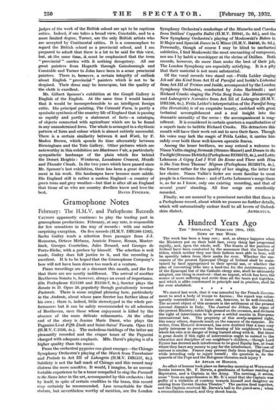Gramophone Notes
February: The H.M.V. and Parlophone Records
CAUTION apparently continues to play the leading part in gramophone productions. February, at any rate, is responsible for few sensations in the way of records : with one rather surprising exception. On five records (H.M.V. DBI588-1592), Sacha Guitry reads a selection from passages from J-J. Rousseau, Octave Mirbeau, Anatole France, Henan, Maeter- linck, Georges Courteline, Jules Renard, and Georges de Porto-Riche, with a preface by himself. The selection is well made, Guitry does full justice to it, and the recording is excellent. It is to be hoped that the Gramophone Company's bow will not have been drawn too much at a venture.
Piano recordings are at a discount this month, and the few that there are are mostly indifferent. The arrival of another Beethoven Sonata is, however, always an event of importance. (On Parlophone E11189 and R1116-7, 9s.), Szreter plays the Sonata in D. Opus 28, popularly though gratuitously termed Pastorale. There is some original phrasing here, particularly in the Andante, about whose pace Szreter has further ideas of his own ; there is, indeed, little stereotyped in the whole per- formance: but it can be safely recommended to all admirers of Beethoven, save those whose enjoyment is killed by the absence of the more delicate refinements. At the other end of the story is Jeanne Marie Darre, who plays the Paganini-Liszt Fifth Etude and Saint-Satins' Toccata. Opus 111 (H.M.V. C.2336, 4s.). The melodious tinklings of the latter are pleasantly recorded and the crisper tones of the Paganini charged with adequate emphasis. Mlle. Darre's playing is of a higher quality than the music.
From the orchestral pygmies one giant emerges—the Chicago Symphony Orchestra's playing of the March from Tannhatiser and Prelude to Act III of Lohengrin (H.M.V. DB1557, 6s.). Subtlety is not the hall mark of Chicago and this record may distress the more sensitive. It would, I imagine, be an uncom- fortable experience to be a tenor compelled to sing the Farewell to the Swan later in the act, accompanied by this orchestra : but by itself, in spite of certain crudities in the brass, this record may certainly be recommended. Less remarkable for their stature, but nevertheless worthy of mention, are the London
Symphony Orchestra's renderings of the Mazurka and Czardas from Delibes' Coppelia Ballet (H.M.V. 113941, 2s. 6d.), and the New Symphony' Orchestra's playing of Moskowski`s Bolero in D Major and Spanish Dance in G Minor (H.M.V. 114046, 2s. dd.). Personally, though of course I may be blind to uncharted subtleties, I find Moskowski the most unexacting of composers, nor am I by habit a worshipper at the shrine of Delibes. Both records, however, do more than make the best of their job. The London Symphony are especially satisfying. It is a pity that their material is not more substantial.
Of the vocal records two stand out—Frida Leider singing Ich sale dos Kind from Art II of Parsifal and Isolde's Liebestod firom Act III of Tristan and Isolde, accompanied by the London Symphony Orchestra, conducted by John Barbirolli ; and Richard Crooks singing the Prize Song from Die Meistersinger and Lohengrin's Narrative from Act III of Lohengrin (H.M.V. DBI598, 6s.). Frida Leider's interpretation of the Parsifal Song (the Herzeleide) is of an exquisite beauty, enriched with great technical accomplishment and a real insight into the dramatic unreality of the scene : the accompaniment is mag- nificent. It is considered in certain quarters a manifestation of a superb taste to belittle Richard Crooks. His detractors this month will have their work cut out to save their faces. Though his voice may lack the magic of Frida Leider, it carries him safely over both these well-known operatic fences.
Among the lesser brethren, we may extend a welcome to Ninon Vallin singing Serenade (Strauss-Masset) and Dream in the Twilight (Strauss-Hettich) (Parlophone R020173, 9s.), and Lotte 'Lehmann A Gipsy Lad I Well Do Know and There with Him is She Now from Thomas' Mignon (Parlophone 8020174, 4s.). the former rather for the quality of her singing, the latter for her choice. Ninon Vallin's lieder are more familiar to most people in a German dress : and of Lotte Lehmann's songs there is, as far as I know, only one existing recording, and that of several years' standing. All four songs are excellently recorded.
Finally, we are assured by a prominent novelist that there is a Parlophone record, about which we possess no further details, which will automatically endear itself to all lovers of Oxford-






































 Previous page
Previous page